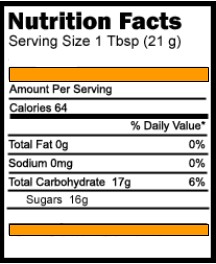How should honey be stored?
Honey should be stored in a sealed container. Room temperature, between 65ºF and 75ºF, best preserves the aroma, flavor, enzymes, and color of unprocessed honey. Honey crystallizes or granulates rapidly between 52ºF and 59ºF, and more slowly at temperatures below 50ºF. Temperatures above 81º degrade the honey and could start fermentation. Do not refrigerate honey.
Does honey expire?
If stored at proper temperature in a sealed container, honey does not spoil or expire. Honey has anti-bacterial and anti-fungal qualities which help it last. Scientists have found honey in the ancient Egyptian pyramids and were amazed that it didn’t expire even after thousands of years. With an indefinite shelf life, honey is considered to be one of nature’s “perfect” foods.
Why does honey crystallize?
All pure raw will crystalize or granulate. It is a natural occurrence, the rate of which is dependent on the floral sources, and is affected by a combination of factors including the moisture content of the honey and the temperature at which it is stored. Honey with a glucose to water ratio at or less than 1.7:1 tend to remain liquid while honey with a glucose to water ratio greater than 2.1:1 usually crystalize quickly. Honey granulates or crystalizes most rapidly between 52ºF and 59ºF, and more slowly at temperatures below 50ºF.
How do you liquefy crystallized honey?
Raw honey may crystallize and turn solid. To liquefy, fill a pan with water and warm to no more than 150ºF/65ºC. Remove pan from heat. Loosen lid of honey jar and place honey jar in the pan of warm water; do not submerge. Soon, the honey will return to liquid form. Do not microwave or use direct heat.
Why are honeys different colors?
Honeys differ in color and flavor depending upon which plants or trees the bees visit in search of nectar sources at different times of the season. Honeys range in color from a pale golden yellow to a dark, almost black, amber-brown. Honeys range in flavor from delicate and mild to robust and bold. As a general rule, much like maple syrup, light-colored honey is milder in flavor and darker colored honey is more strongly flavored.
How long does it take to make honey?
The making of honey is a rather long process dependent on the production of nectar sources within a two mile radius of the hive. To make honey, older worker bees must fill their nectar stomachs by visiting between 100 and 1500 flowers blooming on nearby plants or trees. They then pass this nectar to the younger worker bees in the hive that process the nectar into simple sugars. A healthy colony with a strong nectar flow and mild weather conditions may be expected to produce between sixty and one hundred pounds in a year.
Why should it never be fed to infants under 12 months?
Honey should never be fed directly, or added to food, water, or formula of a child under 12 months. Honey has a potential to contain endospores of Clostridium botulinum. The digestive system of a child is not developed enough to kill the spores. Honey is anti-bacterial, so spores are inactive while in the honey. These spores can become active and start to grow where there is a lack of oxygen. The danger is that spores could colonize inside the child’s intestinal tract where there is low oxygen and reproduce to give off a deadly toxin leading to infant botulism. Typical symptoms from this type of food poisoning include weakening of the muscles causing a child to appear limp and unable to move their arms or legs, a weak cry, poor feeding, constipation, and potential respiratory failure.
Does honey have medicinal properties?
Raw honey contains a variety of plant chemicals that act as antioxidants. In general, the darker the honey, the better its antioxidant power.
Honey has antibacterial and antiseptic qualities. In The Scientific World Journal, researchers provided data confirming that natural honey was as effective as a eusol antiseptic solution in reducing wound infections. When applied topically, honey locks in moisture and nutrients, and helps heal wounds like scars or scratches, and protects against future damage with its antioxidant properties.
Honey is an old sore throat remedy. Add it to hot tea with lemon when a cold virus hits you.
The World Health Organization (WHO) recommends honey as a natural cough remedy. The American Academy of Pediatrics also recognizes honey as a treatment for a cough. However, they advise that honey is not suitable for children under the age of one year. It also works as a cough suppressant. Research has suggested that honey is as effective as dextromethorphan, a common ingredient in over-the-counter cough medication. Just take one or two teaspoonful, straight.
A 2007 study by Penn State College of Medicine suggested that honey reduced night-time coughing and improved sleep quality in children with upper respiratory infection to a greater degree than the cough medicine dextromethorphan.
What nutritional information is available?

